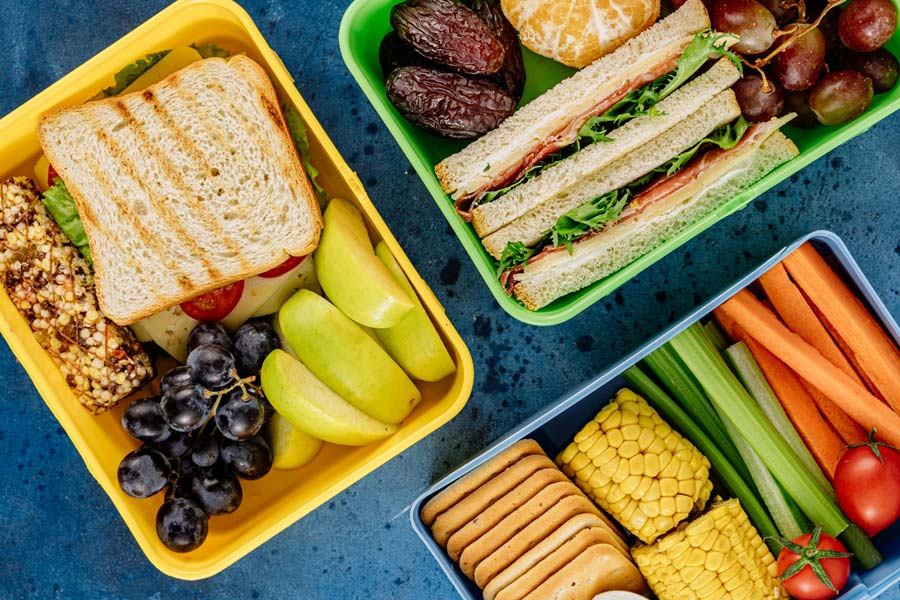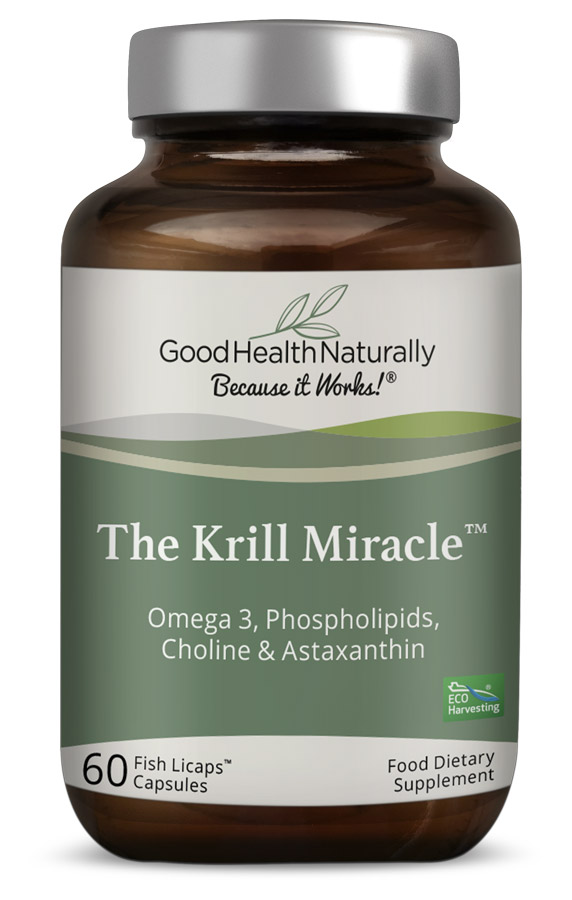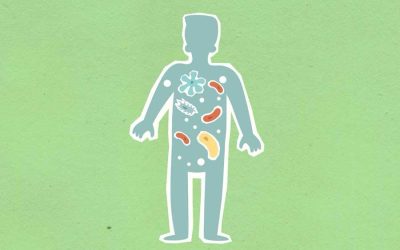A well-nourished brain is more alert, resilient, and ready to learn. By prioritising back-to-school nutrition, parents can help their children feel energised, focused, and set up for a successful start to the academic year.
Why Nutrition Matters for Students
The brain is a highly active organ, consuming up to 20% of the body’s energy. It needs consistent nourishment to function at its best. This means the foods children eat can have a direct influence on:
- Attention span
- Memory retention
- Problem-solving skills
- Mood regulation
- Energy levels
A diet high in added sugars, processed foods, and unhealthy fats can disrupt blood sugar balance, leading to energy crashes, brain fog, and reduced cognitive performance. Whereas a nutrient-rich diet can help support optimal brain function and emotional balance.
What makes a healthy diet?
A key component of back-to-school nutrition is ensuring a balance of protein, healthy fats and slow-release carbs.
Omega-3 Fatty Acids
Sources: Oily fish, like salmon and mackerel, nuts, seeds, especially flaxseeds, chia seeds, walnuts and avocados
Benefits: Omega-3s support brain cell structure, enhance communication between neurons and may improve memory. They are essential for brain health, cognitive function, and overall well-being in growing children.
Complex Carbohydrates
Sources: Whole grains, oats, sweet potatoes, butternut squash, potatoes, beets, parsnips, brown rice, quinoa and beans
Benefits: Complex carbs provide a slow, steady release of glucose to fuel brain activity and prevent fatigue. They are the body’s primary energy source and play a vital role in maintaining focus and stamina. These foods help avoid blood sugar spikes and crashes that can lead to tiredness and loss of concentration.
Protein
Sources: Eggs, lean meats, legumes, tofu, nuts, seeds, muesli, quinoa, organic poultry, wild-caught fish like cod, haddock, mackerel and sardines
Benefits: Protein is essential for growth, development and neurotransmitter production, which influences mood and alertness. Include a variety of protein sources in your child’s meals to support sustained energy and cognitive function throughout the day.
Fibre
Sources: High-fibre foods include brown rice, apples, pears, broccoli, carrots, cauliflower, artichokes, lentils, and kidney beans.
Benefits: Fibre is important for digestive health. It helps prevent constipation, promotes regular bowel movements, and supports a healthy gut microbiome, which plays a crucial role in both immune function and brain health
B Vitamins
Sources: Leafy greens, like spinach and kale, eggs, dairy products, whole grains, legumes, nuts, seeds, poultry, and fortified cereals
Benefits: B vitamins are a group of eight essential nutrients which play a vital role in energy metabolism. They are particularly important for growing children, as they help reduce fatigue, support healthy brain development, and enhance cognitive function, including memory and concentration. Specific B vitamins, such as B6, folate and B12, are essential for the nervous system and the production of neurotransmitters. Deficiencies can lead to tiredness, irritability, and difficulties with concentration.
Water
Often overlooked as a key nutrient, water plays a fundamental role in brain function. Even mild dehydration can impair memory, concentration and mental alertness. Children are especially vulnerable, as they may not recognise early signs of thirst.
Proper hydration helps maintain energy levels, supports digestion and nutrient absorption, and ensures oxygen and nutrients are efficiently transported to the brain. It also helps regulate body temperature, which is especially important during physical activity or warmer months.
Fruits and Vegetables
Fruits and vegetables are rich in vitamins, minerals and antioxidants, which can enhance immune function and support overall health. Opt for organic where possible and aim for a rainbow of colours to ensure a diverse nutrient intake. Berries, pomegranates, apples, spinach, broccoli, Brussels sprouts, red bell peppers and sweet potatoes are known for their high antioxidant content and nutrient density.
Back-to-School Nutrition Tips
Begin the day with a Brain-Boosting Breakfast
A nutrient-dense breakfast supports learning and energy levels. Avoid sugary cereals and pastries, as they can lead to energy crashes. Great choices include:
- Wholegrain oats with almond butter and banana
- Greek yoghurt with berries and granola
- Wholegrain toast with avocado and egg
- Smoothie bowls with nut butter, seeds, and fresh fruit
Pack Smart Lunches and Snacks
A varied lunch, including protein, fibre, and healthy fats, keeps students fuelled throughout the day.
- Wholegrain wraps with lean meat, lettuce, tomato, and hummus
- Salad boxes with veggie sticks, quinoa, hard-boiled eggs and fruit slices
- Veggie sushi rolls made with cucumber, red bell pepper, avocado and carrot.
- Savoury muffins with carrot and courgette, sweet potato and cinnamon, spinach, pumpkin and feta.
- Rice paper rollsfilled with avocado, cucumber, grated carrot and shredded lettuce.
- Quinoa salad with chopped vegetables, chickpeas, or black beans, and a lemony or herby dressing.
- Homemade soup in a flask.
Snack ideas
- Fresh fruit
- Veggie sticks with hummus
- Wholegrain crackers with cheese
- A small handful of nuts or seeds
- Homemade energy bites
Include Brain-Boosting Foods
Incorporate ingredients rich in omega-3 fatty acids and antioxidants. These support cognitive function, and memory and protect brain cells from oxidative stress.
- Avocados, chia seeds, flaxseeds, walnuts
- Blueberries, bananas, leafy greens
- Broccoli, pumpkin seeds, Brazil nuts
Daily Habits to Support Focus
Prioritise Sleep
Children aged 6–18 need 8–10 hours of quality sleep each night. Sleep is crucial for memory consolidation, mood regulation and cognitive performance. Try relaxing in a magnesium-rich bath before bed.
Encourage Movement
Physical activity boosts brain function and mood. Even a short walk before school or homework can enhance focus.
Practice Mindfulness
Simple breathing exercises or guided meditation can improve attention and reduce stress. Try apps like Calm or Headspace.
Limit Screen Time
Reduce distractions with screen-free study times and promote digital breaks.
Stay Organised
Use planners or digital calendars to manage schoolwork. Visual tools like colour-coded checklists help reduce feelings of being overwhelmed.
Make Back-to-School Nutrition Fun
Involve Your Child
Let them help choose fruits and vegetables or assist with meal prep.
Read Food Labels
Teach children about ultra-processed foods, and how food choices affect their energy and mood. Show them how to look for added sugars, trans fats and artificial ingredients.
Plan Ahead
Batch-cook meals and prep in advance. This makes healthy eating more accessible during busy school weeks. Pack portable lunches and snacks for after-school activities.
Final Thoughts
Prioritising back-to-school nutrition is one of the simplest yet most effective ways to support your child’s learning, focus, and emotional wellbeing. By nourishing both brain and body, students are better equipped to absorb knowledge, regulate emotions, and handle the daily challenges that come with a busy school routine.






